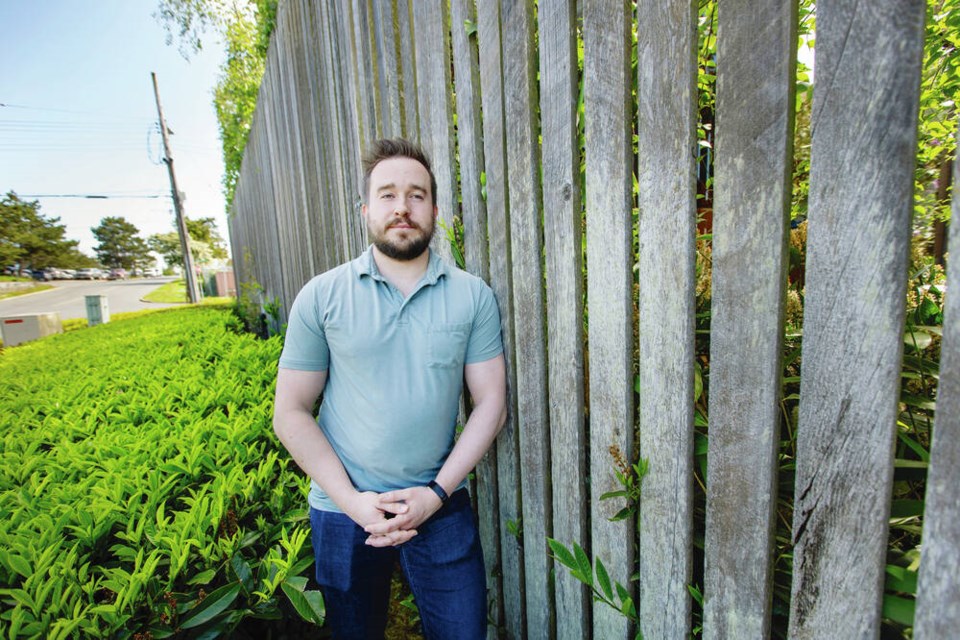Victoria’s real estate market is in the midst of a transition that has prices dropping slightly while available options increase, the president of the Victoria Real Estate Board said Wednesday.
Karen Dinnie-Smyth said the market, which has seen low inventory, lightning-quick deals, high demand and soaring prices over the past two years, is starting to return to a more normal pace. “And the good-news piece out of this is we’re seeing inventory again.”
Sales figures released by the board Wednesday showed 1,776 listings in the region at the end of the month, a 30 per cent jump from the same time last year.
Dinnie-Smyth said if inventory continues to increase while sales remain steady, prices will likely level out or even drop.
That could come too late for some buyers.
Over the past two years, the scarcity of available property coupled with significant demand led to heated competition, with selling prices well over asking.
Eric Loeper recently bought his first home after losing a series of bidding wars over the past two years. He lost some due to pricing and others because of financing conditions.
Loeper said he went from looking at townhomes to being forced to settle for a one-bedroom condo, as prices increased by about 50 per cent. “We lowered our expectations and started looking for condos in Langford. We found one we liked, viewed it the day it was listed, and made an unconditional offer that evening.”
He got that property, but it was the same price as the townhouse he made an offer on six months earlier, although it was half the size and 10 years older.
“Imagine, you have 15 minutes to look around the property before making an unconditional offer and putting up a $20,000 deposit. The biggest decision you ever make, and you have minutes to make it,” he said, noting the “buyer’s remorse” kicked in the minute the papers were signed.
He said they have been asking themselves if they paid too much, and what happens if the market crashes. “To add to that, interest rates started rising. We have endured two interest-rate increases already, and we have not even made our first mortgage payment yet.”
Loeper said because they intend to stay put long-term, he is committed to being happy with the purchase.
But he wants to see changes to give priority to those buying their primary residence, rather than the corporate interest, multi-property owners and international buyers he was often competing with. Buyers like him, he said, “are looking for a place to live, and raise a family, not to make a profit.”
He advocates abolishing blind bidding and requiring sellers to provide a home inspection and proof of insurability so those conditions can be removed for everyone.
Retired armed forces veteran Kelly Carter said he left the region after renting for five years and not being able to find a home to buy. Carter had $100,000 set aside for a down payment and monthly income of about $3,000 but could find nothing but mobile homes in his price range. “I did not want to move back to Alberta, as I started to get to love the area. But I must if I want to return to being an owner again, and get out of the renter’s rut.”
Carter ended up buying a condo in Red Deer, Alta. for $240,000; he saw comparable properties for twice that and more in Greater Victoria.
Another would-be buyer, Cathi McGillivray, said she is angry and frustrated at the price jumps over the past two years. “My dream of buying a little house, gone; a townhouse, gone. Even a condo now, gone,” she said. “I could barely breathe as things changed and just kept going up.”
McGillivray said she was being outbid in some cases by tens of thousands of dollars and cash offers. “I don’t know how young people will ever afford to buy in Victoria without help from parents or an inheritance. How do we expect to keep them here?”
Stella Garcia is renting but has been trying to buy for more than a year, only to see the price of condos jump from $330,000 to $498,000 in a year. She has been outbid several times. “Never in my life did I think I’d try to purchase a condo for $450,000. I am a widow in my 50s and $450,000 is beyond my budget. But what choice do I have? I have no choice but to spend beyond what I can afford, or leave the province.”
The B.C. Financial Services Authority has recommended the province adopt a “cooling-off” period of three business days to protect people buying a home.
The BCFSA advises that sellers be required to provide reasonable access for a property inspection during the three days, which would start the day after an offer is accepted.
Additional recommendations include a five-day “pre-offer” period after a property is listed, when a seller cannot accept any offers.
Dinnie-Smyth said the board agrees with the recommendation of the five-day pre-offer period, although she notes that the BCFSA report leaves procedural questions unanswered.
The government needs to do more consultation with the industry to ensure changes don’t have negative consequences for consumers or the market, she said.
• To comment on this article, write a letter to the editor: [email protected]



